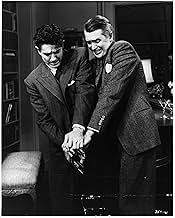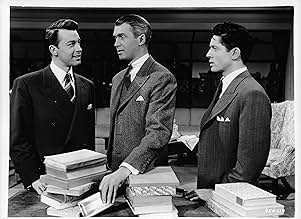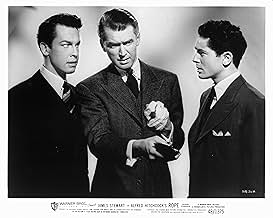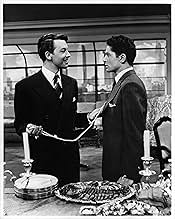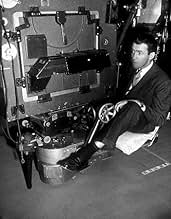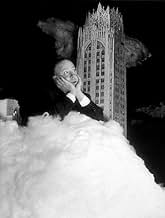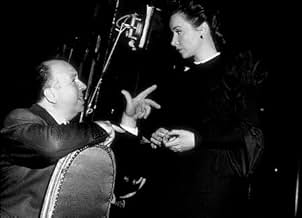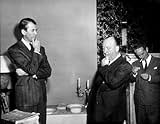दो पुरुष यह साबित करने का प्रयास करते हैं कि उन्होंने अपने पूर्व सहपाठी की गला घोंटकर हत्या करने के बाद डिनर पार्टी की मेजबानी करके सही अपराध किया।दो पुरुष यह साबित करने का प्रयास करते हैं कि उन्होंने अपने पूर्व सहपाठी की गला घोंटकर हत्या करने के बाद डिनर पार्टी की मेजबानी करके सही अपराध किया।दो पुरुष यह साबित करने का प्रयास करते हैं कि उन्होंने अपने पूर्व सहपाठी की गला घोंटकर हत्या करने के बाद डिनर पार्टी की मेजबानी करके सही अपराध किया।
- पुरस्कार
- 4 जीत और कुल 3 नामांकन
Cedric Hardwicke
- Mr. Kentley
- (as Sir Cedric Hardwicke)
Alfred Hitchcock
- Man Walking in Street After Opening Credits
- (बिना क्रेडिट के)
Peggy Robertson
- Woman Walking on Sidewalk
- (बिना क्रेडिट के)
फ़ीचर्ड समीक्षाएं
This 1948 Hitchcock film is mostly noted for its technical achievements. Hitchcock filmed this story, about two well-to-do rich kids who decide to commit a murder for the fun of it, as a play. Which, it in fact, originally was, though based in London and not New York. Technical limitations did not enable his original vision of making the entire picture one continuous long shot. Instead it is made up of several 8 minute continuous shots. This was the length of film that fit into one reel. Using some very inventive cutting techniques the film appears as if it was filmed all in one take. This is more impressive when you see the actual size that color film cameras were during this time period. They were absolutely enormous, bigger than a man standing. To move the camera in and around the small stage space, many of the set pieces were set on casters and rolled about to keep out of the way of the camera. Some of the actors were noted in saying that they worried every time they sat down, that there might not be a chair for them to fall into. Another achievement of the film is in terms of lighting. The apartment that the entire film is set in has several large windows overlooking the city. As the movie is more or less uninterrupted from start to finish we see the lighting change as the sun begins to set and night falls. It is a testament to this achievement that upon first viewing you don't really notice the effect. Yet, the filmmakers took great pains to get it to look realistic, staging numerous re-shoots for the final few scenes.
Though the technical achievements are quite wonderful, it is a shame that they have overshadowed what it really a very good bit of suspense. It seems the two high society murderers have planned a dinner party just after the murder. They store the corpse in a wood box that is featured prominently in the midst of the dinner. This creates an excellent mix of suspense and the macabre. Throughout the party the murderers become more unraveled even as they are enjoying their little game.
All of the acting is quite good. The two murderer (John Dall and Farley Granger) do a fine job of playing intellectual, society playboys, with a desire for excitement. It is slightly annoying watching their excited, nervous mannerisms (especially some stuttering by Jon Dall) but it is fitting with the characters. Their former instructor, Rupert Cadell, is played magnificently by the impeccable James Stewart. This is a bit of departure from Stewarts typical roles. Here he is a tough, cynical intellectual. This was his first of four collaborations between Stewart and Hitchock and it is hard to imagine his role as Scottie in Vertigo without having first played in this movie.
The story unravels in typical Hitchock fashion. The suspense is built, then lessoned by some well timed comedy, and then built again to a final crescendo. Hitchcock was excellent as a technical director and allowed his actors the breathing room they needed for fine performances. In the end I left the picture feeling more excited about the superb storytelling than any particular technical achievement. It is a testament to his craft, that Hitchock allows you to leave a picture being enamored with his story over his technical achievements. Some of the greatest effects are those you don't notice because they seem so natural and real.
Alfred Hitchock manages a triumph of technical brilliance and suspense in Rope. It's influence in the technical realm of cinema far outshines any effect the story has on future movies. This is a shame, for the story being told is one of suspense, macabre and excitement.
Like this review? Go to www.midnitcafe.blogspot for more.
Though the technical achievements are quite wonderful, it is a shame that they have overshadowed what it really a very good bit of suspense. It seems the two high society murderers have planned a dinner party just after the murder. They store the corpse in a wood box that is featured prominently in the midst of the dinner. This creates an excellent mix of suspense and the macabre. Throughout the party the murderers become more unraveled even as they are enjoying their little game.
All of the acting is quite good. The two murderer (John Dall and Farley Granger) do a fine job of playing intellectual, society playboys, with a desire for excitement. It is slightly annoying watching their excited, nervous mannerisms (especially some stuttering by Jon Dall) but it is fitting with the characters. Their former instructor, Rupert Cadell, is played magnificently by the impeccable James Stewart. This is a bit of departure from Stewarts typical roles. Here he is a tough, cynical intellectual. This was his first of four collaborations between Stewart and Hitchock and it is hard to imagine his role as Scottie in Vertigo without having first played in this movie.
The story unravels in typical Hitchock fashion. The suspense is built, then lessoned by some well timed comedy, and then built again to a final crescendo. Hitchcock was excellent as a technical director and allowed his actors the breathing room they needed for fine performances. In the end I left the picture feeling more excited about the superb storytelling than any particular technical achievement. It is a testament to his craft, that Hitchock allows you to leave a picture being enamored with his story over his technical achievements. Some of the greatest effects are those you don't notice because they seem so natural and real.
Alfred Hitchock manages a triumph of technical brilliance and suspense in Rope. It's influence in the technical realm of cinema far outshines any effect the story has on future movies. This is a shame, for the story being told is one of suspense, macabre and excitement.
Like this review? Go to www.midnitcafe.blogspot for more.
Alfred Hitchcock directed so many brilliant movies that the best known ones like 'Rear Window', 'Vertigo', 'Psycho' and 'The Birds' overshadow equally worthy films like 'Shadow Of A Doubt', 'Lifeboat' - insert your personal favourite here - and this one, 'Rope'. It was the first Hitchcock movie to feature James Stewart and it is easily the most underrated of the four movies they made together. I think Stewart was brave for taking this part, which was much darker than the usual characters associated with him, and it's difficult to imagine him being able to play Scottie in 'Vertigo' without having done this movie first. Stewart is excellent in the movie, but equally good are Farley Grainger (who subsequently starred in Hitchcock's 'Strangers On A Train') and John Dall as the thrill killers. Dall gives the best performance in the movie. I'm surprised that after making this and the Noir cult classic 'Gun Crazy' he isn't better known. The technical "gimmick" of 'Rope' is usually mentioned more than anything else about it (Hitchcock wanted one long continuous take, which wasn't possible at the time, but compromised by using several long ones, a very innovative approach at the time), but there is a lot more to it than just that. Considering the strict censorship of the period it was a daring look at homosexuality. The word is never used at any time in the script but a sophisticated audience would have no doubt what was really going on. I've only seen about a third of Hitchcock's output but every movie of his I watch or rewatch makes me marvel at him all the more. The greatest and most influential director of suspense movies was also one of the greatest directors of ANY genre ever. 'Rope' deserves to be mentioned in any list of his ten best movies. 55 years after it was originally released it is as fascinating and entertaining as ever. Highly recommended!
No need to recap the plot.
Leave it to Hitch to venture into uncharted Hollywood territory. First, the movie's a "real time" screenplay that blends 80-mintes of character time into 80-minutes of screen time without a noticeable cut-away. It's the first time, I believe, this was tried. Practically speaking, the movie's almost a filmed stage play. The pitfalls here are many and obvious. Fortunately, the script is generally involving and avoids a chief pitfall by developing the storyline without much drag. At the same time, the characters are a generally colorful lot, especially caterer Wilson (Evanson) and dowager Collier (Atwater). Then too, Hitch's camera heightens developments in unobtrusive fashion, so that we get listener reactions at the same time the speaker is speaking. That way our interest is spread over a number of characters. Second is his use of gay actors (Dall & Granger) to portray scarcely veiled gay characters Brandon & Phillip, respectively. I guess the movie was banned in many locales because of that taboo, (IMDB). Nonetheless, the aspect makes for an interesting subtext, one that Hitch was later to use in Strangers On A Train (1951).
Acting-wise, Dall does well as the intellectual snob, while Granger plays a nervous second fiddle. The Nietzschean theme seems a little shopworn so soon after WWII, but works well enough here as dark motivation. However, I could have done without Rupert's (Stewart) reproofing lecture at movie's end. There should have been a subtler alternative. Plus, his character comes across as something of a stretch. But then convention required someone to put things right, even if Rupert has rather confusingly inspired the Nietzschean-type murder, in the first place
All in all, I can see why many balk at Hitch's experimental result. It is a noticeable departure from the norm. Still, I think the aspects come together well enough to remain an engaging hour-plus, even if not among his best suspense features. At the same time, I can see why the real-time single-set approach never caught on. In lesser hands, it's a time bomb.
Leave it to Hitch to venture into uncharted Hollywood territory. First, the movie's a "real time" screenplay that blends 80-mintes of character time into 80-minutes of screen time without a noticeable cut-away. It's the first time, I believe, this was tried. Practically speaking, the movie's almost a filmed stage play. The pitfalls here are many and obvious. Fortunately, the script is generally involving and avoids a chief pitfall by developing the storyline without much drag. At the same time, the characters are a generally colorful lot, especially caterer Wilson (Evanson) and dowager Collier (Atwater). Then too, Hitch's camera heightens developments in unobtrusive fashion, so that we get listener reactions at the same time the speaker is speaking. That way our interest is spread over a number of characters. Second is his use of gay actors (Dall & Granger) to portray scarcely veiled gay characters Brandon & Phillip, respectively. I guess the movie was banned in many locales because of that taboo, (IMDB). Nonetheless, the aspect makes for an interesting subtext, one that Hitch was later to use in Strangers On A Train (1951).
Acting-wise, Dall does well as the intellectual snob, while Granger plays a nervous second fiddle. The Nietzschean theme seems a little shopworn so soon after WWII, but works well enough here as dark motivation. However, I could have done without Rupert's (Stewart) reproofing lecture at movie's end. There should have been a subtler alternative. Plus, his character comes across as something of a stretch. But then convention required someone to put things right, even if Rupert has rather confusingly inspired the Nietzschean-type murder, in the first place
All in all, I can see why many balk at Hitch's experimental result. It is a noticeable departure from the norm. Still, I think the aspects come together well enough to remain an engaging hour-plus, even if not among his best suspense features. At the same time, I can see why the real-time single-set approach never caught on. In lesser hands, it's a time bomb.
Rope is one of the finer films that Hitchcock made. Philosophy, sociology and psychology are contained in equal parts. The plot is simple, the characters are complex and Hitchcock's treatment of the Leopold and Loeb parallel quite deft. The final soliloquy from Jimmy Stewart's character, Rupert, is not only one of the finest examples of Stewart's acting abilities but also of film-making.
On the subject of filmmaking - Hitchcock filmed this in as much of a single take as possible. I believe there are only five edits in the whole thing. I can wholeheartedly tell you that it was no gimmick on Hitchcock's part. The play's plot requires that a certain amount of tension be maintained. Tracking shots are used for this purpose and quite well in my opinion. Timing, position and prop movements alone are to force us to stand in awe of a logistical challenge. All the actors are played superbly. The dialogue is natural and flowing. The finest bit of timing involves a swinging kitchen door, the rope, and the fear of discovery.
In short, this is a fine film that cannot disappoint. Highly recommended and will be well worth your time.
On the subject of filmmaking - Hitchcock filmed this in as much of a single take as possible. I believe there are only five edits in the whole thing. I can wholeheartedly tell you that it was no gimmick on Hitchcock's part. The play's plot requires that a certain amount of tension be maintained. Tracking shots are used for this purpose and quite well in my opinion. Timing, position and prop movements alone are to force us to stand in awe of a logistical challenge. All the actors are played superbly. The dialogue is natural and flowing. The finest bit of timing involves a swinging kitchen door, the rope, and the fear of discovery.
In short, this is a fine film that cannot disappoint. Highly recommended and will be well worth your time.
'Rope', as many reviews here point out, is shot in a "real time" format. The movie lasts 80 minutes and takes place over a period of 80 minutes - with 10 8 minute takes spliced together smartly (such as switching when focused on a back) to give the appearance of one long take. Even current "real time" dramas such as "Nick of Time" or "24" use cuts - and perhaps justifiably.
"Rope" is about two college students - the slimy Brendon Shaw (John Dall) and his friend and sub-texted-gay-partner Phillip Morgan (Farley Granger) who murder an old college mate and then, minutes after, host a dinner party to prove their calm, intellectual superiority and their "right" to kill off the lower echelons of society - they believe they are exempt from common morality. Central to this is their smug desire to show off their theory to their old mentor, Rupert Cadell (James Stewart), who is attending the party, and to get him to agree with their theories.
As the movie is essentially confined to one room, and one take, there's a definite "play" feel to the movie. While this worked wonderful with "12 Angry Men", the script and character interaction isn't quite smart enough here to sustain it. There's a lot of pontificating by Shaw, and some fine retorts by Cadell but there's a sense of forcedness about it at the same time. Only 3 of the characters are drawn with enough conviction, and it is only Cadell who we can really admire (Granger's Morgan seems to be too much of a nervous twitching type to add much to the movie). The script does allow us to gape with incredulity at the Nietzsche-esque theories of the "superman" espoused by Shaw, and the gay subtext is amusingly, and cleverly, done but there's an inevitability about the whole story - we know what will happen, it does, and this creates an ultimate lack of tension (when compared to, for example, Hitchock's "Vertigo").
The direction is, as would be expected, smart and - naturally - innovative here. The camera drifts about from character to character, as Hitchock tries his "one cut" approach, and there's some nice background detail (such as Hitchcock's flashing neon signs) to show the passage of time/current theme. Overall "Rope" is well worth seeing - it's not quite a failed experiment, nor a successful one. It's a "curio" which is worth appreciating for realizing why it was never really emulated since.
"Rope" is about two college students - the slimy Brendon Shaw (John Dall) and his friend and sub-texted-gay-partner Phillip Morgan (Farley Granger) who murder an old college mate and then, minutes after, host a dinner party to prove their calm, intellectual superiority and their "right" to kill off the lower echelons of society - they believe they are exempt from common morality. Central to this is their smug desire to show off their theory to their old mentor, Rupert Cadell (James Stewart), who is attending the party, and to get him to agree with their theories.
As the movie is essentially confined to one room, and one take, there's a definite "play" feel to the movie. While this worked wonderful with "12 Angry Men", the script and character interaction isn't quite smart enough here to sustain it. There's a lot of pontificating by Shaw, and some fine retorts by Cadell but there's a sense of forcedness about it at the same time. Only 3 of the characters are drawn with enough conviction, and it is only Cadell who we can really admire (Granger's Morgan seems to be too much of a nervous twitching type to add much to the movie). The script does allow us to gape with incredulity at the Nietzsche-esque theories of the "superman" espoused by Shaw, and the gay subtext is amusingly, and cleverly, done but there's an inevitability about the whole story - we know what will happen, it does, and this creates an ultimate lack of tension (when compared to, for example, Hitchock's "Vertigo").
The direction is, as would be expected, smart and - naturally - innovative here. The camera drifts about from character to character, as Hitchock tries his "one cut" approach, and there's some nice background detail (such as Hitchcock's flashing neon signs) to show the passage of time/current theme. Overall "Rope" is well worth seeing - it's not quite a failed experiment, nor a successful one. It's a "curio" which is worth appreciating for realizing why it was never really emulated since.
क्या आपको पता है
- ट्रिवियाSince the filming times were so long, everybody on the set tried their best to avoid any mistakes. At one point in the movie, during the first take scene, the camera dolly accidentally ran over and broke a cameraman's foot, but to keep filming, he was gagged and dragged off the soundstage. Another time, a woman puts her glass down but misses the table. A stagehand had to rush up and catch it before the glass hit the ground. Both parts are used in the final cut.
- गूफ़When Phillip and Brandon put David in the chest, the rope is clearly around David's neck and completely inside the box. But in a few minutes Phillip finds the rope hanging, very far, outside the box.
- भाव
Mrs. Atwater: Do you know, when I was a girl I used to read quite a bit.
Brandon: We all do strange things in our childhood.
- क्रेज़ी क्रेडिटThe closing credits list the victim David Kentley first, and the rest of the cast as credited with a phrase describing their relation to him ("His friends - Brandon, Phillip", "David's girl - Janet", etc) and use only a first/last name.
Rupert Cadell is listed last, and with his full name and without any phrase of relation.
- कनेक्शनFeatured in Great Performances: James Stewart: A Wonderful Life (1987)
टॉप पसंद
रेटिंग देने के लिए साइन-इन करें और वैयक्तिकृत सुझावों के लिए वॉचलिस्ट करें
विवरण
बॉक्स ऑफ़िस
- बजट
- $15,00,000(अनुमानित)
- दुनिया भर में सकल
- $11,580
- चलने की अवधि
- 1 घं 20 मि(80 min)
- रंग
- पक्ष अनुपात
- 1.37 : 1
इस पेज में योगदान दें
किसी बदलाव का सुझाव दें या अनुपलब्ध कॉन्टेंट जोड़ें



